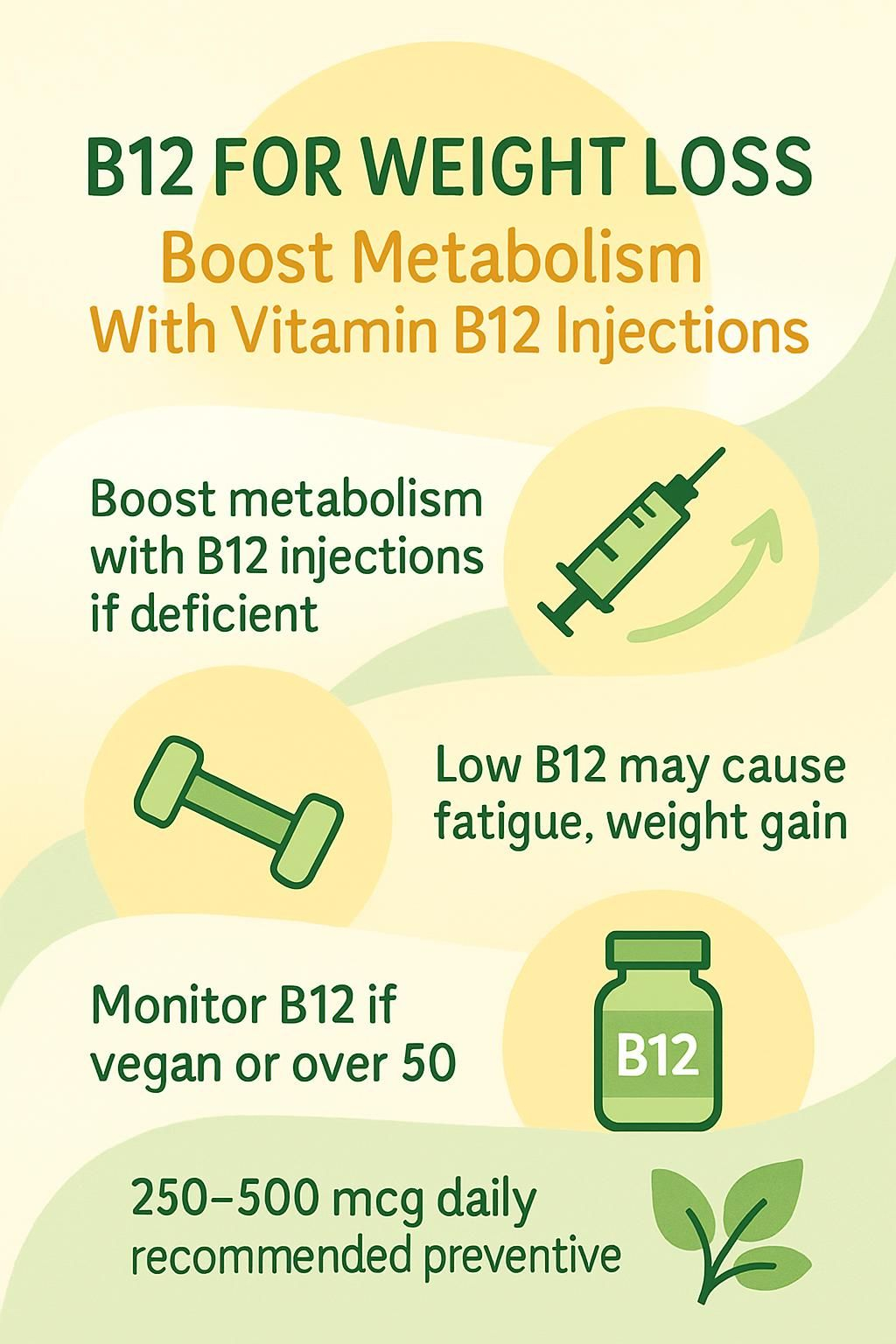B12 For Weight Loss: Boost Metabolism With Vitamin B12 Injections
Our Nutrition Assistant AI Suite will transform your body. You will lose fat, get toned, and build muscle. Gain confidence and optimal health.
If losing weight feels slow, you are not alone. Many people battle low energy and a sluggish metabolism. Vitamin B12 injections get attention because this vitamin helps your body make energy from food, which can support a healthy weight loss plan.
In this guide, you will learn how vitamin B12 works, who may benefit from b12 shots or supplements, and what research says about using them to help you lose weight. You will also see clear steps to check your status and add safe options to your routine.
Find out if B12 could play a helpful role in your healthy weight loss plan.
Key Takeaways
- Vitamin B12 injections may raise energy and support metabolism if you have a deficiency. Studies do not show meaningful weight loss in people with normal B12 levels.
- B12 is required for red blood cell production, nerve health, and fat metabolism. Low levels can cause fatigue and may make weight control harder.
- Adults over 50, people on vegan or plant-based diets, and those taking medicines like metformin have a higher risk of low B12 and should monitor levels.
- Side effects of B12 shots can include dizziness, nausea, rash, and rare allergic reactions. People with cobalt allergy or Leber’s disease should avoid them.
- Fortified foods and oral supplements help most people without absorption problems. Preventive oral doses of 250 to 500 mcg daily are commonly recommended in clinical guidance.

What Is Vitamin B12 and Why Is It Important?

Vitamin B12 is a water-soluble nutrient your body needs to make red blood cells and convert food into energy. It supports brain and nerve function, metabolism, and DNA synthesis. These jobs explain why steady B12 intake matters for long-term health.
What role does Vitamin B12 play in the body?
Your body uses vitamin B12 to build red blood cells that carry oxygen to your muscles and organs. Without enough B12, you can develop anemia, leading to tiredness and weakness.
B12 helps copy DNA during cell growth. It also supports enzymes that turn fats, proteins, and carbohydrates into ATP, the fuel your cells use for energy.
Healthy B12 status supports brain and nerve health by protecting nerve fibers. Adequate intake may help preserve memory as you age.
Vitamin B12 also helps break down homocysteine, a compound linked with heart problems at high levels. In short, B12 is key for metabolism, muscle function, and overall wellness.
Why is Vitamin B12 important for overall health?
Vitamin B12 affects many systems at once, which is why steady intake is so important. It supports clear thinking and stable mood by aiding nerve function. Low B12 has been linked with a higher risk of depression in several studies.
B12 also prevents certain types of anemia that cause fatigue and weakness. Some research connects low B12 status with poorer bone health and a higher risk of fractures.
During a brief plant-based phase, you might notice lower energy if your meals lack B12 sources like meat and dairy. A quick blood test can confirm low status. With your clinician’s guidance, supplements can restore normal levels within weeks.
Summary: B12 supports brain and nerve health, red blood cell production, energy, and bone health. Keeping your vitamin b12 level in range makes daily life and weight goals easier.
How Vitamin B12 Affects Metabolism
Think of metabolism as your body’s engine. Vitamin B12 helps keep that engine tuned, especially if your levels are low.
How does Vitamin B12 support energy production?
You need B12 to turn food into usable energy. B12 helps enzymes break down carbs, fats, and proteins to make ATP inside your cells. If levels drop, these processes slow, which can cause low energy and fatigue.
B12 works with folate and other B vitamins to support red blood cell formation, so oxygen reaches your muscles during activity.
Low levels often lead to weakness and less exercise tolerance. Correcting a deficiency with B12 injections or oral supplements can increase daily activity once your clinician confirms the need.
“B vitamins, including vitamin B12, support how your body turns what you eat into energy.”
Next, see how B12 connects with fat metabolism and body composition.
What is the connection between Vitamin B12 and fat metabolism?
Vitamin B12 supports enzymes that break down fatty acids, turning them into energy instead of storing them as body fat. When B12 is low, this process can slow down, which may promote fat storage.
Research in the journal Nutrients reports an association between low B12 status and changes in lipid metabolism, the way your body handles fat. People with adequate B12 often show better control of body mass index than those who are deficient.
Keeping your vitamin b12 level healthy will not replace diet and exercise, but it supports how your body uses fat for energy.
Causes and Effects of Vitamin B12 Deficiency
Low vitamin B12 can drain your energy and can make weight control tougher. Knowing the causes and symptoms helps you act early.
What are common causes of Vitamin B12 deficiency?
Most natural sources of B12 come from animal foods like fish, dairy, and meat. Vegan and strict vegetarian diets increase risk, unless you use fortified foods or supplements.
Absorption problems are another common cause. Pernicious anemia, celiac disease, Crohn’s disease, and weight loss surgery can reduce your ability to absorb B12 from food.
Some medicines lower absorption. Metformin for type 2 diabetes, stomach acid reducers, and certain antibiotics can lead to low B12 over time. If you take these, regular monitoring is smart.
A short example: after starting metformin, you could notice a drop in energy. Your doctor may check B12 and discuss pills or injections if levels are low.
What symptoms indicate low Vitamin B12 levels?
Watch for these signs. Early action can prevent lasting nerve problems.
- Fatigue and weakness that persist even after a full night’s sleep.
- Pale or yellowish skin due to macrocytic anemia, which reduces oxygen delivery.
- Tingling or numbness in hands, arms, legs, or feet from nerve irritation.
- Balance or coordination problems that make walking harder.
- Shortness of breath or a fast heartbeat with severe deficiency.
- Glossitis, mouth ulcers, and changes in taste.
- Mood or memory changes, including irritability or confusion.
- Visual changes like blurred vision or light sensitivity in long-term deficiency.
- Weight gain from low energy and reduced activity.
- More frequent infections due to weaker immune responses.
If you notice several of these, ask your healthcare provider for testing. Treatment can include tablets, capsules, or injections based on your needs.
How does Vitamin B12 deficiency relate to weight gain?
People with low B12 often feel tired and move less. Less movement and slower metabolism can contribute to weight gain, especially with a high fat diet. Several studies link low B12 status with a higher risk of being overweight or obese.
If you are working on medical weight loss or you eat a plant-based diet, keeping your B12 intake steady can support progress.
Understanding Vitamin B12 Injections
Vitamin B12 injections deliver B12 into muscle, which allows quick absorption into the bloodstream.
What are Vitamin B12 injections?
These are intramuscular shots that provide a high dose of B12. A clinician may inject your upper arm, thigh, hip, or abdomen. Shots are used to treat pernicious anemia and other causes of B12 deficiency.
Injections can help when you need rapid correction, you cannot absorb B12 well through the gut, or you have deficiency symptoms like fatigue and weakness. Some weight loss programs include B12 shots with diet and exercise to support energy in active people.
How are B12 injections different from oral supplements?
B12 injections bypass digestion and go straight into your bloodstream. This helps people with absorption problems, including pernicious anemia or certain gut disorders.
Tablets, capsules, and fortified foods work well if you absorb nutrients normally. If you do not, levels may stay low despite regular use.
A brief example: you might try oral B12 for months and still feel worn out. After your dietitian reviews your labs, switching to shots could raise your levels faster and ease fatigue within weeks.
Can Vitamin B12 Injections Aid Weight Loss?
Some people feel a lift in energy after shots, which can make exercise easier. The effect on fat loss depends on your starting B12 status, your diet, and your activity.
How might Vitamin B12 injections boost metabolism?
Injections deliver a concentrated dose, which can restore low levels quickly. B12 supports red blood cell production and cellular energy pathways. Early research from pre-clinical and clinical studies links healthy B12 status with better fat breakdown during activity, especially when combined with a healthy diet and regular exercise.
If a lab test confirms deficiency, shots can help you feel more energetic. Better energy often leads to more movement, which supports weight loss over time.
What effects do B12 injections have on energy and activity?
Many people report feeling less tired within days to weeks of starting injections, especially if low B12 was the cause. More energy can help you stick with daily walks, workouts, and meal planning.
Preventing deficiency with routine doses supports consistent physical activity. This steady activity is a key part of a lasting weight loss plan.
What does clinical research say about B12 injections and weight loss?
Clinical trials do not show strong evidence that B12 shots cause weight loss in people who already have normal B12 levels. Treating a deficiency can reduce fatigue and support exercise, but B12 itself is not a fat burner.
Some small studies test combinations of folate and vitamin B12 for exercise performance. Results are mixed. If you want more energy for workouts, first check if low B12 is part of the problem.
Key Benefits of Vitamin B12 Injections for Weight Loss
Think of B12 as a support tool. It can help you use food for fuel, but it works best alongside diet and exercise.
How do B12 injections boost metabolism?
Injections raise your blood levels fast, which helps cells convert fats and carbs into ATP. Without enough B12, you may feel sluggish and notice slower metabolism. People with deficiency often report stronger energy and better workout tolerance after treatment.
If you have trouble absorbing B12 from food or pills, injections may be more effective. Higher blood levels can reduce fatigue, which makes it easier to stay active and burn calories.
Can B12 injections support healthy digestion?
B12 helps enzymes break down carbs, fats, and proteins at the cell level. That supports how your body uses nutrients from food. Direct proof that injections speed digestion is limited.
If you have low stomach acid or difficulty absorbing B12, injections bypass the gut and can restore levels. Some people notice steadier energy and more regular bowel habits once deficiency is corrected.
Do B12 injections enhance energy for exercise?
Low B12 often makes workouts feel harder. Restoring normal levels, whether by shots or high-dose oral supplements, can improve stamina in people with a documented deficiency.
Shots reach the bloodstream quickly and may help you resume training sooner. Always talk with a clinician before starting injections, especially if you are balancing other nutrients such as vitamin D, vitamin K, and vitamin B6.
Additional Health Benefits of Vitamin B12 Injections
Correcting low B12 supports oxygen delivery and nerve function, which can improve daily life.
How do B12 injections improve red blood cell production?
B12 is required for DNA synthesis in bone marrow. When levels are low, red blood cells become large and misshapen, which can lead to anemia. Injections correct deficiency faster than pills in people with absorption problems.
As healthy red blood cells increase, oxygen delivery improves. Many people notice better energy within weeks, which makes exercise and weight goals more manageable.
What support do B12 injections provide for brain and nerve health?
Vitamin B12 helps produce myelin, the protective coating around nerves. Adequate B12 supports memory, focus, and mood. Low levels can cause tingling hands or feet, brain fog, or mood changes.
If you are deficient, injections can raise your levels quickly and may reduce these symptoms. A short course of oral B12 also helps many people when absorption is normal.
Can B12 injections reduce fatigue?
Yes, if fatigue is driven by low B12. Correcting a deficiency often improves energy within days to weeks. Shots work faster than oral forms for people who cannot absorb B12 well.
As energy steadies, many people report better focus and productivity. Always work with your healthcare provider to select the right dosage and schedule.
What Are the Risks and Side Effects of B12 Injections?
Most people tolerate B12 shots well, but side effects can occur. Knowing what to expect helps you respond quickly.
What are common side effects of Vitamin B12 injections?
- Dizziness or lightheadedness soon after an injection.
- Nausea or occasional vomiting that usually fades within hours.
- Diarrhea that is typically mild and short term.
- Itching, warmth, or rash at the injection site. Hives or swelling can signal an allergy.
- Redness or swelling near the injection site. In rare cases, a blood clot in a vein requires urgent care.
- Allergic reactions are uncommon but serious. Seek emergency care for trouble breathing or facial swelling.
- Temporary fatigue while your body adjusts. Hydration and rest can help.
Discuss risks and benefits with your clinician before starting injections.
Who should avoid receiving B12 injections?
Avoid B12 shots if you have a known allergy to B12 or cobalt. Tell your clinician about every medicine and supplement you use, since some drugs can interact with B12.
People with certain rare optic nerve disorders such as Leber’s disease should not receive these injections. Your healthcare provider can review your history and decide on a safe plan.
Where Can You Get Vitamin B12 Besides Injections?
You can meet your needs with food, fortified products, or supplements. Choose the path that fits your diet and health status.
Which foods are good sources of Vitamin B12?
- Beef liver, about 3 ounces, often has more than 70 micrograms.
- Salmon or tuna, 2.5 to 5 micrograms per serving.
- Dairy foods like milk, cheese, and yogurt. One cup of milk has about 1 microgram.
- Eggs. Two large eggs provide about 0.6 micrograms, mostly in the yolk.
- Shellfish, including clams and oysters. Three ounces of cooked clams can provide up to 84 micrograms.
- Fortified breakfast cereals, sometimes up to 6 micrograms per serving.
- Vitamin B12 capsule supplements are available for those who prefer not to change their diet.
- Fortified nutritional yeast, a vegan option that can deliver several micrograms per tablespoon.
Adding salmon and eggs to your weekly menu is a simple way to raise intake and support energy.
What plant-based or fortified foods contain B12?
- Fortified cereals, many with 100 percent of the daily value per serving.
- Fortified plant milks like soy or almond. Check labels for exact amounts.
- Fortified nutritional yeast, often around 2.4 micrograms per tablespoon.
- Fortified vegan spreads or margarines with added B12.
- Plant-based meat alternatives that list B12 on the label.
- Some energy drinks and multivitamins include B12. Do not use these as meal replacements.
- Global fortification efforts have grown because long-term vegan diets without supplements can raise deficiency risk.
Are B12 supplements effective alternatives?
For many adults, oral B12 works well and is easy to find. Research supports daily supplements for prevention and for mild deficiency, especially if absorption is normal.
Common preventive doses are 250 to 500 micrograms per day. Correcting deficiency often requires higher doses as directed by your clinician. People with severe absorption problems may still need injections.
Regular blood tests help you and your healthcare provider track progress and adjust dosage.
How Do You Know If You Need Vitamin B12 Injections?
Testing is the sure way to know. Symptoms can guide you to ask for a blood test and a plan.
What signs suggest a Vitamin B12 deficiency?
- Persistent fatigue or muscle weakness.
- Pale skin, shortness of breath, or other signs of anemia.
- Tingling, numbness, or burning in hands or feet.
- Memory problems, trouble focusing, or a low mood.
- Mouth sores or a swollen, red tongue.
- Vision changes in long-standing deficiency.
- Digestive issues such as constipation or diarrhea.
- Low energy that improves after starting B12 on your clinician’s advice.
When should you consult a healthcare provider about B12?
Talk with a clinician if you notice symptoms, are over age 50, follow a vegan or vegetarian diet, or have digestive conditions that affect absorption. If you are pregnant or planning pregnancy, ask about B12 as part of prenatal care.
Early testing can prevent nerve damage and help you feel better sooner. If a deficiency is found, your provider will guide you on shots or pills.
How to Include Vitamin B12 in Your Weight Loss Plan
B12 supports energy so you can follow through on healthy habits. Pair it with simple, steady routines.
How can you combine B12 injections with diet and exercise?
Use a balanced plate with lean protein, whole grains, vegetables, fruits, and healthy fats. Aim for a slow weight loss pace of one to two pounds per week. Limit added sugar and highly processed foods. Drink at least eight cups of water daily.
Schedule 150 minutes of moderate cardio each week and add two days of resistance training. Sleep seven to nine hours per night and use stress relief skills like stretching or deep breathing.
As an example, combining B12 treatment for a confirmed deficiency with a simple meal plan and brisk walks can raise energy and make progress steady.
What are good ways to monitor your progress with B12?
Track your weight, waist size, steps, and workouts each week. Log energy, mood, sleep, and appetite. Note the dates of injections or supplement doses.
Set follow-up visits for lab checks of your B12 level. Review results with your clinician, then adjust your plan. These small checkpoints help you see what is working.
What Are Common Myths About B12 and Weight Loss?
Big claims spread fast online. Sorting fact from fiction keeps your plan safe and focused.
What false claims exist about B12 for weight loss?
Some ads suggest B12 shots alone melt fat. Research does not support this. Others say you can skip diet and exercise if you get injections. That is misleading.
B12 helps most when you are deficient. Correcting low levels can restore energy so you can follow your plan, but the shots are not a shortcut.
What does the science say about B12’s role in weight loss?
Studies show limited evidence for weight loss from B12 injections in people with normal levels. If you are deficient, fixing the deficiency can support energy and activity, which helps you stick with your plan.
During marathon training, someone with a confirmed low B12 level might feel better after treatment, but the shot itself would not change weight without diet and exercise. A 2022 review supports this view.
Who Benefits Most from Vitamin B12 Injections?
Some groups are more likely to benefit from shots, especially when absorption is a challenge.
Why might individuals with deficiency benefit?
If you are deficient, your body may not absorb B12 from food or standard pills. Injections deliver the nutrient directly into muscle, then into your bloodstream. Conditions like pernicious anemia, Crohn’s disease, celiac disease, and some gut surgeries raise the need for this approach.
Once levels normalize, many people report better energy, improved concentration, and fewer nerve symptoms. Red blood cell production also returns to normal. Source: NIH Office of Dietary Supplements, Vitamin B12 Fact Sheet for Health Professionals, 2023.
How can athletes and active people gain from B12 injections?
Athletes need steady energy and oxygen delivery. B12 supports red blood cell production and energy metabolism. If you have low or borderline levels, correcting them can reduce fatigue and improve training quality.
You may notice easier workouts after levels are restored. Evidence is mixed for people with normal B12, so testing is the best first step.
Are B12 injections helpful for those on plant-based diets?
Plant foods contain little natural B12. Fortified foods and supplements are key for plant-based eaters. If levels drop, injections can correct deficiency quickly because they bypass the gut.
Some studies suggest many long-term vegetarians develop low B12 without steady supplementation. Regular monitoring keeps you on track. Reference: Stabler SP, Vitamin B12 Deficiency, New England Journal of Medicine, 2013.
Frequently Asked Questions About Vitamin B12 and Weight Loss
Here are brief answers to common questions. Use them to start a conversation with your healthcare provider.
How soon can you expect to see results from B12 injections?
Energy can improve within a few days if you were deficient. Changes in weight usually take weeks to months and depend on diet, activity, and sleep. The shot supports your plan; it is not a stand-alone weight loss method.
Track your energy and workouts. If you feel better, use that momentum to be more active and to plan meals.
How often should B12 injections be given?
The schedule depends on your labs, symptoms, and response. Many clinicians start with weekly or bi-weekly shots for several weeks, then space them out to monthly maintenance once levels stabilize.
Your provider will choose the dose and timing. Do not self-inject without training and a clear prescription plan.
What are the alternatives to B12 injections?
Oral supplements work well for most people without absorption problems. Fortified cereals, plant milks, and nutritional yeast are convenient food options. Sublingual tablets are another choice if you prefer them.
For prevention, many guidelines suggest 250 to 500 micrograms daily. For deficiency, clinicians often use higher-dose oral B12 or injections. Sources: NIH Office of Dietary Supplements and Harvard T.H. Chan School of Public Health.
Conclusion
Vitamin B12 injections can boost energy and support metabolism if you have low vitamin b12. They work best as part of a full weight loss plan that includes balanced meals, exercise, sleep, and stress control.
If you feel tired or progress has stalled, ask your healthcare provider to check your vitamin b12 level. Then choose the right option for you, injections or oral supplements, based on your results and medical history.
This article is educational and is not medical advice. Always follow guidance from your licensed healthcare professional.
FAQs
1. How does vitamin B12 support weight loss and metabolism?
Vitamin B12 helps the body convert food into energy, which supports metabolic processes. Studies show that people with low levels of this nutrient may experience slower metabolism rates, making it harder to lose weight. Supplementing with injections can help restore normal levels and improve energy production in those who are deficient.
2. Are vitamin B12 injections effective for everyone trying to lose weight?
Vitamin B12 injections benefit individuals who have a deficiency or trouble absorbing nutrients from food due to medical conditions like pernicious anemia or gastrointestinal disorders. For people without a deficiency, research has not shown significant effects on weight loss outcomes.
3. What are the typical side effects of vitamin B12 injections for boosting metabolism?
Most people tolerate these shots well; however, some may notice mild reactions such as pain at the injection site or headaches. Rarely, allergic responses occur but are uncommon according to clinical data published by health organizations.
4. Can you share an example of how someone used vitamin B12 for weight management?
A patient diagnosed with low serum cobalamin experienced fatigue and slow progress during their diet plan. After starting regular supplementation under medical supervision, they reported increased energy and improved adherence to exercise routines over several months; lab results confirmed restored nutrient status.
Summary: Vitamin B12 plays a key role in converting food into usable energy and supporting healthy metabolism rates when deficiencies exist. Injections offer benefits mainly for those lacking adequate amounts due to absorption issues or specific health problems rather than serving as a universal solution for all seeking rapid fat reduction.







